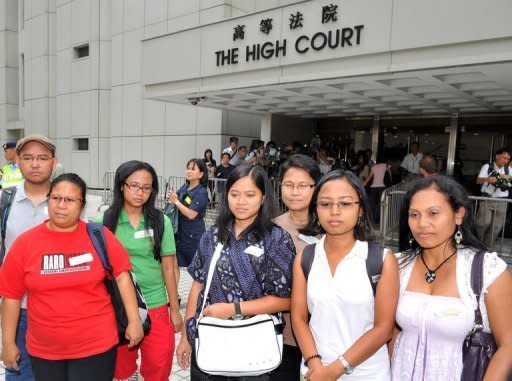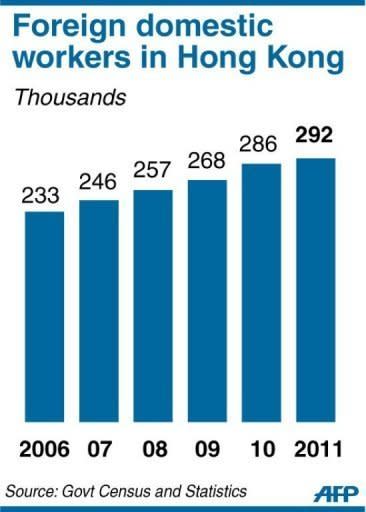Foreign maids win landmark Hong Kong residency case
A Hong Kong court ruled on Friday that a law banning foreign maids from permanent residency is unconstitutional in a landmark case that could pave the way for a flood of applications. The legal action brought by Evangeline Banao Vallejos, a domestic helper from the Philippines who has lived in the city since 1986, has cast a spotlight on the treatment of Hong Kong's army of 292,000 domestic workers. The High Court ruled that immigration laws barring domestic workers -- mostly from the Philippines and Indonesia -- from settling permanently violated Hong Kong's mini-constitution, known as the Basic Law. "The mere maintenance of link with her country of origin does not mean that (a maid) is not ordinarily resident in Hong Kong," Judge Johnson Lam wrote in a 78-page judgement, the first case of its kind in Asia. Foreigners can apply to settle in Hong Kong after seven years of uninterrupted residency, gaining access to voting rights and the right to live in the city without a work visa. Maids were specifically excluded. Vallejos, a 59-year-old mother of five, challenged the restriction, saying it was unconstitutional and discriminatory, but the government argued it was "appropriate" and it was empowered to define who is eligible for residency. Foreign maids -- like other expats -- must still fulfill other criteria before gaining residency rights, including proving they planned to make Hong Kong their permanent home. "I am disappointed, but we are fully prepared for any court ruling," Hong Kong's chief executive Donald Tsang said as the government said it would appeal the ruling. The government said it planned to ask the court's permission to not process any foreign maids' residency applications until the appeal was finished. Vallejos's lawyer Mark Daly lauded the High Court's decision as "a good win for the rule of law" and said that Vallejos "thanks God and all the people who have helped her, including her employer and her lawyers." "She is busy working so she has no time to be here today," he added. The Philippines and Indonesia applauded the decision as a welcome recognition of the contribution of millions of citizens who work abroad, with Jakarta saying it was "a benchmark" for other countries to follow. But critics said it could open the floodgates to new immigrants in an already overcrowded and expensive city. About 117,000 foreign maids are entitled to apply for permanent residency following the ruling. Outside the High Court, maid supporters duelled with groups opposing their residency rights, in an angry protest involving several dozen people. "We are sad, angry and disappointed. A huge number of the domestic workers are going to migrate to the city and it will strain our resources," said Jeff Lam, spokesman for Hong Kong Social Concern Group. Friday's ruling could have implications for other Asian economies that rely on cheap imported labour for cooking, cleaning and care of the young and elderly, allowing the local women to join the workforce. Foreign maids in Hong Kong are entitled to better working conditions than in other parts of Asia -- they are guaranteed one day off a week, paid sick leave, and a minimum wage of HK3,740 ($480) a month. But rights groups say they still face general discrimination and a lack of legal protection. A maid's visa is tied to a specific employer, leaving her vulnerable, the activists say. Another court hearing will be held on October 26 over whether Vallejos can now be declared a permanent resident. Vallejos's husband of 37 years, who is in the Philippines, said he would join her in Hong Kong, court documents showed. Vallejos's case is the first of five launched by Filipinos -- the others involve a couple, and a mother and son. All five are seeking permanent residency and all the cases will be heard in October. The case has also highlighted the issue of the city's judicial independence from Beijing, after some lawmakers called on Hong Kong to refer the case to mainland authorities for their interpretation of the Basic Law.



